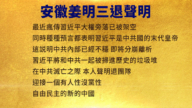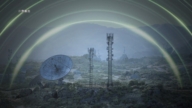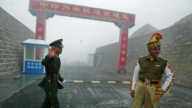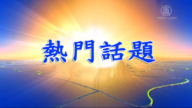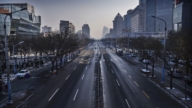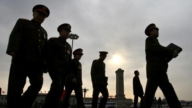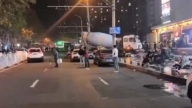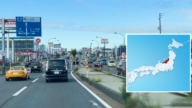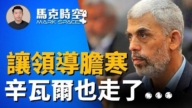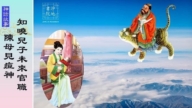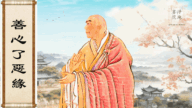【新唐人2013年07月19日訊】16號,湖北武漢舉行第40屆國際橫渡長江活動。在報導這項活動時,大陸官媒罕見播出了毛澤東遊泳渡長江的歷史鏡頭。 1966年毛澤東在長江游泳之後,立即開始打倒劉少奇、鄧小平,並全面掀起「文化大革命」狂潮。官媒的這篇高調報導,引發外界各種揣測。
中共的喉舌之一《央視》電臺,在新聞節目中播出一段影片,作為報導武漢橫渡長江活動的新聞背景。這段影片長近4分鐘,講述前中共黨魁毛澤東1956年到1966年42次遊長江的歷史,裡面有毛的大量游泳照片和部分錄像。報導說,湖北武漢每年7月16號舉行的橫渡長江活動,就是為了紀念毛在1966年最後一次渡江。
與此不同的是,2010年《央視》在報導武漢渡江活動時,僅在體育頻道播出1分鐘節目,其中毛渡江的游泳鏡頭只有大約3秒,報導規格與今年相差很大。
毛澤東1966年在武漢長江游泳之後,便立即著手打倒劉少奇、鄧小平,全面推進「文化大革命」。此後,游泳渡長江也成為一種政治儀式。
美國「中國社會民主黨」中央委員會主持人劉因全:「現在還在去長篇報導這些問題、還在去頌揚毛澤東當年遊長江,這是很反常的。這顯示有一個團體想向左轉,想還是要回到毛澤東那個時代。」
大陸前《新華社》記者高瑜也談到,毛澤東當年為了鞏固權力,發起各種政治運動,大搞人民公社、大躍進,直至一手製造「文化大革命」,給中國帶來巨大災難。
前《新華社》記者高瑜:「66年就是文革開始,所以也就是這樣了。就說明現在堅定不移的要把毛澤東的一切錯誤要抹過去,以求得當今中共政權的合法性。」
近來,大陸官媒在關於習近平「中國夢」的詮釋、廢除勞教制度等方面一直處於混亂狀態,左右兩派論戰不斷,被外界評為中共高層左右為難、進退失據。這其中,左派言論曾一度喧囂直上。
劉因全:「毛澤東的階級鬥爭為綱、發動文革、發動不明真相的群眾、特別是青年學生打倒政敵,這一套辦法有可能還會被使用。」
香港媒體引述中國「華東政法大學」教師張雪忠的話說,這段時間官方意識形態明顯左轉,毛澤東家鄉湖南的政法機關開會時掛出毛澤東畫像,中共高層也不斷使用毛時代的語言。張雪忠認為,中共新任領導層很可能想要通過左傾在黨內占有更多話語權,從而穩固手中權力,但這不會是另一次「文革」的前奏,因為時空環境已不同。
近期,中共高層不斷推出各種執政言論,包括:「前30年、後30年互不否定」、「中國夢」、「三個自信」也就是所謂「道路自信、理論自信、制度自信」等,來試圖為中共尋找執政合法性。
高瑜:「合法性就是:我們成績是偉大的,我們的道路是正確的,對人民犯下的罪錯是絲毫也不檢討的。」
7月11號,中共總書記習近平重回30多年前起家的河北正定縣,並到有像徵意義的中共老巢——河北省平山縣西柏坡村參觀,也曾引發外界關注。 《大紀元》新聞網報導,目前中共高層已公開分裂,習近平、李克強與江澤民派系搏擊升級。最令習近平頭痛的薄熙來案,最近更是風聲滿天飛。這對於習近平來說,將面臨一場政治上的「決戰」。在此背景下,習近平的西柏坡之行,有決心迎戰之意。
採訪/李韻 編輯/李謙 後製/葛雷
Speculation Over CCP Media Broadcasting Mao Zedong Footage
On July 16, the 40th Wuhan International Yangtze
River Crossing Festival was held in Hubei province.
Chinese state media showed footage of former dictator
Mao Zedong, who swam across the Yangtze River in 1966.
After this event, Mao began persecuting
Liu Shaoqi, and Deng Xiaoping.
He also started the Cultural Revolution Movement.
These high-profile media reports on Mao
have triggered international speculation.
The Chinese Communist Party’s (CCP) state-run
China Central Television (CCTV) introduced the background to the festival on it’s news programme.
The 4 minute news piece showed documentary
photos and footage about Mao, who crossed Yangtze River 42 times between1956 to 1966.
The report said that the annual July 16 festival
of crossing the Yangtze River is to commemorate
Mao’s last swim in the Yangtze River in 1966.
Looking back to 2010, CCTV only did a one minute
brief report on the same event during it’s sports program.
In the report, CCTV used 3 seconds of the footage of
Mao, so the weight of Mao content was very different.
After crossing the Yangtze River in 1966, Mao immediately
began the persecution of Li Shaoqi and Deng Xiaoping.
He also implemented the Cultural Revolution in it’s entirety.
Since then, the festival has become a political ritual.
Liu Yinquan, Chairman of US-based Social Democratic
Party of China: “It is unusual to report and praise Mao crossing the Yangtze River with such lengthy news.
It indicates that a CCP faction wants to turn
“left", and would rather to return to the Mao era."
Gao Yu, former journalist of Xinhua, said that to strengthen
power, Mao launched various political campaigns.
This included the People’s Communes, the
Great Leap Forward and the Cultural Revolution.
He brought catastrophic disasters to China.
Gao Yu: “It was in 1966 that the Cultural Revolution began.
Now things like this happen, so it is still hopeless.
It shows that the CCP wants to wipe clean
all of Mao’s mistakes, so as to get legitimacy."
Media in China are still chaotic in reporting Xi Jinping’s
“China Dream", and abolishing the labor camp system.
The struggle between the “leftists”
and “rightists" has never stopped.
International observers comment that the high-levels
of the CCP high-level are in a difficult situation.
Sometimes, leftist opinion takes the lead.
Liu Yinquan: “Mao used class struggle
as a key to launch the Cultural Revolution.
It was used to manipulate civilians
who didn’t know the truth.
This was particularly young students,
who beat down Mao’s political rivals.
This method is likely to be used again."
Media in Hong Kong cited Zhang Xuezhong, a teacher
of Political Science and Law, in East China University.
It said that right know, CCP official’s
ideology is obviously turning to the “left".
Political and legal organs in Mao’s hometown of Hunan
held a meeting with Mao’s portrait being hung up.
High-level CCP officials constantly
quote Mao’s words.
Zhang Xuezhong believes that the new
leadership intends to use a left stance.
It is obtaining more opportunities to
speak, so as to strengthen its power.
However, Liu Yinquan doesn’t consider this
a prelude for another Cultural Revolution.
This is because we are now in a
different environment, space and time.
Recently, high-level CCP officials continue
to implement various political opinions.
It includes, “no criticism of what has been done in the
last 30 years, or what happens in the next 30 years".
It also includes the “China Dream"
and the “three self-confidences".
The purpose is to try to find a
way of legitimacy for the CCP.
Gao Yu: “For the CCP, legitimacy
is that its achievement are great.
It wants the Chinese people to think that the
CCP’s path is correct, and the crimes it has
committed against them will never find justice."
On July 11, Xi Jinping visited Zhengding county in Hebei.
Province. This is where he started his career 30 years ago.
It drew a lot of public attention when Xi visited Xibaipo
village, which was a CCP central office before 1949.
The Epoch Times website reported that high
levels of the CCP have openly split.
The struggle for Xi Jinping and Li Keqiang with
Jiang Zemin’s faction has intensified to new levels.
The Bo Xilai case is a headache for Xi,
with rumors spread all over the places.
For Xi, he will face a final political battle.
In this regard, Xi visiting of Xibaipo village
shows he has likely made up his mind to fight.




